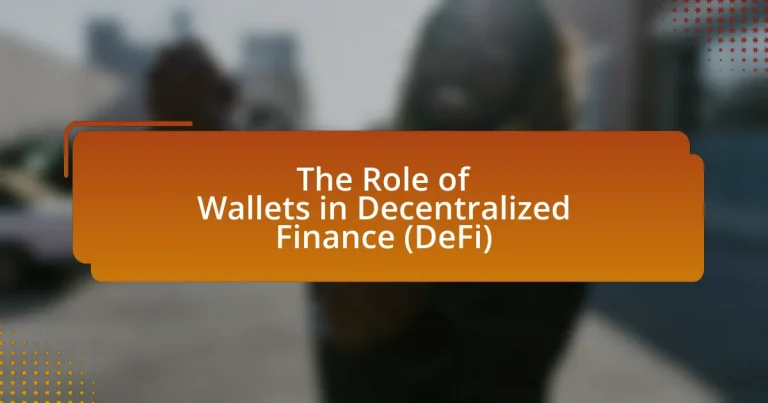Wallets play a crucial role in Decentralized Finance (DeFi) by enabling users to securely store, manage, and interact with their digital assets. They facilitate transactions on blockchain networks, allowing users to engage with decentralized applications (dApps) without intermediaries. The article explores various types of wallets, including hot and cold wallets, and their impact on user experience, security features, and governance participation within the DeFi ecosystem. Additionally, it addresses the challenges wallets face, such as security vulnerabilities and usability issues, while providing best practices for users to enhance their wallet security and functionality.
--Wallets-in-Decentralized-Finance-(DeFi)-1.webp)
What is the Role of Wallets in Decentralized Finance (DeFi)?
Wallets in Decentralized Finance (DeFi) serve as essential tools for users to store, manage, and interact with their digital assets securely. These wallets enable users to hold cryptocurrencies, access decentralized applications (dApps), and execute transactions on blockchain networks without relying on intermediaries. For instance, non-custodial wallets allow users to maintain control over their private keys, enhancing security and ownership of assets. According to a report by Chainalysis, the use of wallets in DeFi has surged, with over $80 billion locked in various DeFi protocols as of 2021, highlighting their critical role in facilitating decentralized financial activities.
How do wallets function within the DeFi ecosystem?
Wallets in the DeFi ecosystem serve as secure storage solutions for cryptocurrencies and tokens, enabling users to interact with decentralized applications (dApps) and manage their digital assets. They facilitate transactions by allowing users to send, receive, and swap assets without relying on centralized intermediaries. Wallets can be categorized into hot wallets, which are connected to the internet for ease of access, and cold wallets, which are offline for enhanced security.
The functionality of wallets is crucial for DeFi, as they provide users with private keys that grant control over their assets, ensuring that only the wallet owner can authorize transactions. This decentralized control is fundamental to the ethos of DeFi, promoting user autonomy and reducing reliance on traditional financial institutions. Furthermore, wallets often integrate with various DeFi protocols, enabling users to participate in lending, borrowing, and yield farming directly from their wallets, thus enhancing the overall user experience in the DeFi landscape.
What types of wallets are used in DeFi?
The types of wallets used in DeFi include hot wallets, cold wallets, and hardware wallets. Hot wallets are connected to the internet and facilitate quick transactions, making them suitable for active trading. Cold wallets, on the other hand, are offline storage solutions that provide enhanced security for long-term asset holding. Hardware wallets, a subset of cold wallets, are physical devices that securely store private keys and are considered one of the safest options for managing cryptocurrencies in DeFi. These distinctions are crucial for users to choose the appropriate wallet based on their trading needs and security preferences.
How do different wallet types impact user experience in DeFi?
Different wallet types significantly impact user experience in DeFi by influencing security, accessibility, and transaction efficiency. Hardware wallets offer enhanced security through offline storage, appealing to users prioritizing asset protection, while software wallets provide greater accessibility and ease of use, catering to those who value convenience for frequent transactions. Additionally, mobile wallets enhance user experience by enabling on-the-go access to DeFi services, which is crucial for users who engage in trading or yield farming. The choice of wallet type directly affects how users interact with DeFi platforms, as evidenced by a survey indicating that 70% of users prefer software wallets for their ease of use, while only 30% opt for hardware wallets despite their superior security features.
Why are wallets essential for DeFi users?
Wallets are essential for DeFi users because they provide secure storage and management of digital assets, enabling users to interact with decentralized applications (dApps) and protocols. Without wallets, users cannot access their cryptocurrencies or participate in DeFi activities such as lending, borrowing, or trading. Wallets facilitate transactions on the blockchain, ensuring that users maintain control over their private keys and funds, which is crucial for security and autonomy in the decentralized finance ecosystem.
What security features do wallets provide in DeFi?
Wallets in DeFi provide several key security features, including private key management, multi-signature support, and hardware wallet integration. Private key management ensures that users retain control over their assets, as the private keys are stored locally and not on centralized servers, reducing the risk of hacks. Multi-signature support requires multiple private keys to authorize a transaction, enhancing security by distributing control among several parties. Hardware wallet integration allows users to store their private keys offline, providing an additional layer of protection against online threats. These features collectively safeguard users’ assets and enhance the overall security of decentralized finance transactions.
How do wallets facilitate transactions in DeFi?
Wallets facilitate transactions in DeFi by securely storing private keys that grant access to users’ digital assets and enabling the execution of smart contracts. These wallets interact with decentralized applications (dApps) on blockchain networks, allowing users to send, receive, and manage cryptocurrencies without intermediaries. For instance, Ethereum wallets enable users to engage with various DeFi protocols, such as lending and borrowing platforms, by signing transactions that are recorded on the blockchain. This process ensures transparency and security, as all transactions are immutable and verifiable on the network.

What are the key features of DeFi wallets?
DeFi wallets are designed to facilitate decentralized finance transactions, and their key features include non-custodial control, interoperability, and support for multiple cryptocurrencies. Non-custodial control allows users to retain ownership of their private keys, ensuring that they have full control over their funds without relying on a third party. Interoperability enables these wallets to connect with various DeFi protocols and platforms, allowing users to engage in activities such as lending, borrowing, and trading seamlessly. Additionally, support for multiple cryptocurrencies ensures that users can manage a diverse portfolio within a single wallet interface, enhancing convenience and usability. These features collectively empower users to participate actively in the DeFi ecosystem while maintaining security and flexibility.
How do wallets ensure user control over assets?
Wallets ensure user control over assets by allowing individuals to manage their private keys, which are essential for accessing and transacting with their digital assets. By retaining ownership of these private keys, users maintain full control over their funds, as transactions can only be authorized by the key holder. This decentralized approach contrasts with traditional financial systems, where third parties often hold control over user assets. The security of wallets, particularly hardware and software wallets, further reinforces this control by providing encryption and secure storage options, ensuring that only the user can access their assets.
What is the significance of private keys in wallet security?
Private keys are crucial for wallet security as they provide the sole means of accessing and controlling the assets stored within a cryptocurrency wallet. Without the private key, users cannot authorize transactions or access their funds, making it the most critical component of wallet security. The loss or theft of a private key results in irreversible loss of access to the associated assets, underscoring its importance. According to a report by Chainalysis, over $3.2 billion in cryptocurrency was lost due to private key mismanagement in 2020, highlighting the need for secure storage and management practices.
How do wallets support multi-chain functionality?
Wallets support multi-chain functionality by integrating multiple blockchain networks within a single interface, allowing users to manage assets across different chains seamlessly. This is achieved through the use of cross-chain protocols and standards, such as the Inter-Blockchain Communication (IBC) protocol, which enables the transfer of tokens and data between distinct blockchains. Additionally, wallets often utilize decentralized applications (dApps) and smart contracts to facilitate transactions across various networks, ensuring compatibility and interoperability. For example, wallets like MetaMask and Trust Wallet allow users to switch between Ethereum, Binance Smart Chain, and other networks, demonstrating their capability to handle multiple chains effectively.
What role do wallets play in DeFi governance?
Wallets serve as essential tools for participating in DeFi governance by enabling users to hold, manage, and utilize their digital assets for voting on protocol decisions. In decentralized finance, governance tokens are often stored in wallets, allowing holders to vote on proposals that affect the platform’s development, policies, and resource allocation. For instance, platforms like MakerDAO and Compound utilize governance tokens that are directly linked to wallet addresses, ensuring that only token holders can influence governance outcomes. This mechanism fosters a decentralized decision-making process, as the distribution of tokens across various wallets reflects the community’s interests and priorities.
How can wallet holders participate in governance decisions?
Wallet holders can participate in governance decisions by utilizing their wallets to vote on proposals and changes within a decentralized finance (DeFi) protocol. Many DeFi platforms implement governance tokens that are distributed to wallet holders, granting them voting rights proportional to the number of tokens they hold. For example, holders of governance tokens like Uniswap’s UNI or Compound’s COMP can vote on key issues such as protocol upgrades, fee structures, and other significant changes. This system ensures that those who are invested in the ecosystem have a say in its direction, thereby promoting a decentralized decision-making process.
What impact does wallet integration have on governance protocols?
Wallet integration significantly enhances governance protocols by facilitating seamless participation and decision-making for users. When wallets are integrated with governance systems, they allow token holders to easily vote on proposals and changes, thereby increasing engagement and transparency. For instance, platforms like Compound and MakerDAO utilize wallet integration to enable users to directly interact with governance mechanisms through their wallets, which streamlines the voting process and ensures that governance is more accessible. This integration also helps in tracking voting power and participation rates, leading to more informed and democratic decision-making within decentralized finance ecosystems.

What challenges do wallets face in the DeFi space?
Wallets in the DeFi space face several challenges, including security vulnerabilities, user experience issues, and regulatory compliance. Security vulnerabilities arise from the risk of hacks and exploits, as evidenced by the $1.4 billion lost to DeFi hacks in 2021 alone. User experience issues stem from the complexity of managing private keys and navigating decentralized applications, which can deter mainstream adoption. Additionally, regulatory compliance poses a challenge as wallets must navigate varying regulations across jurisdictions, impacting their functionality and accessibility.
How do security vulnerabilities affect wallet usage in DeFi?
Security vulnerabilities significantly reduce wallet usage in DeFi by increasing the risk of asset loss and fraud. Users are less likely to engage with wallets that have known vulnerabilities, as evidenced by incidents like the $60 million hack of the DeFi platform Poly Network in 2021, which highlighted the potential for exploitation. This leads to a lack of trust in wallet providers and a decrease in overall participation in DeFi ecosystems. Consequently, the presence of security vulnerabilities directly impacts user confidence and the adoption rate of decentralized finance wallets.
What are common security threats to DeFi wallets?
Common security threats to DeFi wallets include phishing attacks, smart contract vulnerabilities, and private key exposure. Phishing attacks trick users into revealing sensitive information, often through fake websites or emails. Smart contract vulnerabilities arise from coding errors or exploits that can lead to unauthorized access or loss of funds; for example, the DAO hack in 2016 resulted in a loss of $60 million due to a vulnerability in the smart contract code. Private key exposure occurs when users fail to securely store their keys, making them susceptible to theft. These threats highlight the importance of security measures in protecting DeFi wallets.
How can users protect their wallets from potential risks?
Users can protect their wallets from potential risks by implementing strong security measures such as using hardware wallets, enabling two-factor authentication, and regularly updating software. Hardware wallets store private keys offline, significantly reducing the risk of hacking, as they are less susceptible to online threats. Two-factor authentication adds an extra layer of security by requiring a second form of verification, making unauthorized access more difficult. Regular software updates ensure that wallets have the latest security patches, protecting against newly discovered vulnerabilities. These practices are supported by cybersecurity studies indicating that hardware wallets are among the safest options for storing cryptocurrencies, as they mitigate risks associated with online storage.
What are the usability challenges for DeFi wallet users?
DeFi wallet users face several usability challenges, including complex user interfaces, security concerns, and a lack of customer support. Complex user interfaces can overwhelm users, especially those unfamiliar with blockchain technology, making it difficult to navigate and perform transactions. Security concerns arise from the need for users to manage private keys and seed phrases, which, if lost or compromised, can lead to irreversible loss of funds. Additionally, the decentralized nature of DeFi often results in limited customer support, leaving users without assistance when encountering issues. These challenges hinder user adoption and overall experience in the DeFi ecosystem.
How does user interface design impact wallet adoption?
User interface design significantly impacts wallet adoption by influencing user experience and accessibility. A well-designed interface enhances usability, making it easier for users to navigate and perform transactions, which can lead to increased adoption rates. For instance, research indicates that 94% of first impressions are design-related, highlighting the importance of an intuitive and visually appealing interface in attracting users. Additionally, wallets that prioritize user-friendly features, such as simplified onboarding processes and clear transaction flows, tend to see higher engagement and retention, as evidenced by studies showing that 70% of users abandon applications due to poor usability.
What educational resources are available for new wallet users?
New wallet users can access a variety of educational resources to enhance their understanding of decentralized finance (DeFi) and wallet usage. These resources include online tutorials, webinars, and documentation provided by wallet providers such as MetaMask and Trust Wallet, which offer step-by-step guides on wallet setup and security practices. Additionally, platforms like Coursera and Udemy offer courses specifically focused on blockchain technology and cryptocurrency wallets, helping users grasp fundamental concepts. Community forums such as Reddit and Discord channels also serve as valuable platforms for peer support and knowledge sharing among users.
What best practices should users follow when using DeFi wallets?
Users should follow several best practices when using DeFi wallets to ensure security and efficiency. First, users must enable two-factor authentication (2FA) to add an extra layer of security to their accounts. This practice significantly reduces the risk of unauthorized access, as it requires a second form of verification beyond just a password.
Second, users should regularly update their wallet software to protect against vulnerabilities. Keeping the software up to date ensures that users benefit from the latest security patches and features.
Third, users must securely back up their wallet recovery phrases and private keys. This practice is crucial because losing access to these credentials can result in permanent loss of funds.
Fourth, users should only interact with reputable DeFi platforms and smart contracts. Engaging with well-audited projects minimizes the risk of scams and exploits, as these platforms have undergone thorough security assessments.
Lastly, users should be cautious of phishing attempts and avoid sharing sensitive information. Recognizing and avoiding suspicious links and communications helps protect users from potential fraud.
These best practices are essential for maintaining security and maximizing the benefits of using DeFi wallets.
How can users ensure the security of their wallet assets?
Users can ensure the security of their wallet assets by implementing strong security practices such as using hardware wallets, enabling two-factor authentication, and regularly updating software. Hardware wallets store private keys offline, significantly reducing the risk of hacking, as evidenced by the fact that over 90% of cryptocurrency thefts occur from online wallets. Enabling two-factor authentication adds an extra layer of security, making unauthorized access more difficult. Regularly updating wallet software ensures that users benefit from the latest security patches and features, which is crucial given that vulnerabilities are often exploited shortly after they are discovered.
What steps should users take to choose the right wallet for their needs?
Users should evaluate their needs, security features, and compatibility when choosing the right wallet. First, users must identify whether they require a hot wallet for frequent transactions or a cold wallet for long-term storage. Next, they should assess the wallet’s security measures, such as two-factor authentication and private key management, to ensure their assets are protected. Additionally, compatibility with various cryptocurrencies and decentralized applications is crucial, as it determines the wallet’s usability within the DeFi ecosystem. By considering these factors, users can select a wallet that aligns with their specific requirements and enhances their experience in decentralized finance.
It is not possible to provide an answer to the question “
” as it does not contain a specific inquiry or context to address.


